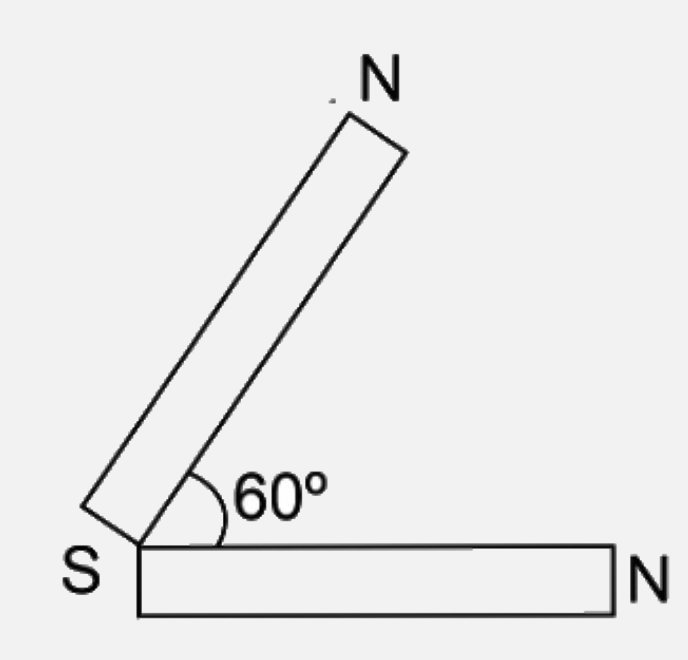A: A system can have magnetic moments even though its net charge is zero.
R: Magnetic moment is created by charges in motion.
If both Assertion & Reason are the true and the reason is the correct explanation of the assertion, then mark (1)
If both Assertion & Reason are true but the reson is not the correct explanation of the assertion, then mark (2)
If Assertion is true statement but Reason is false, then mark (3)
If both Assertion and Reason are false statements, then mark (4)
The correct Answer is:A
To solve the question, we need to analyze both the assertion (A) and the reason (R) provided.
Step 1: Analyze the Assertion (A)
The assertion states: "A system can have magnetic moments even though its net charge is zero."
- Explanation: This statement is true. A system can indeed have a magnetic moment even if the total charge is zero. This is because magnetic moments arise from the motion of charges (currents) within the system, and not solely from the net charge. For example, consider a neutron, which has no net charge but possesses a magnetic moment due to the motion of its constituent quarks.
Step 2: Analyze the Reason (R)
The reason states: "Magnetic moment is created by charges in motion."
- Explanation: This statement is also true. A magnetic moment is generated when charges move, creating a current. The magnetic moment is directly related to the amount and direction of this current. Thus, even if the net charge of a system is zero, the individual charges can still be in motion, contributing to a non-zero magnetic moment.
Step 3: Determine the Relationship Between A and R
Now, we need to determine if the reason correctly explains the assertion.
- Explanation: The reason does correctly explain the assertion. The assertion highlights that a system can have a magnetic moment despite having a net charge of zero. The reason clarifies that this magnetic moment arises from the motion of charges. Therefore, the motion of charges (as stated in the reason) is what allows for the existence of a magnetic moment, even when the net charge is zero.
Conclusion
Both the assertion and the reason are true, and the reason correctly explains the assertion.
Final Answer
Both assertion and reason are true, and the reason correctly explains the assertion.
---
The assertion states: "A system can have magnetic moments even though its net charge is zero."
The reason states: "Magnetic moment is created by charges in motion."
Now, we need to determine if the reason correctly explains the assertion.
Both the assertion and the reason are true, and the reason correctly explains the assertion.
Both assertion and reason are true, and the reason correctly explains the assertion.
Topper's Solved these Questions
- MAGNETISM AND MATTER BOOK - AAKASH INSTITUTE ENGLISHCHAPTER - MAGNETISM AND MATTER EXERCISE - ASSIGNMENT (SECTION C)
34 Videos
- LAWS OF MOTIONBOOK - AAKASH INSTITUTE ENGLISHCHAPTER - LAWS OF MOTIONEXERCISE - Assignment (SECTION-D) (Assertion-Reason Type Questions)
15 Videos
- MECHANICAL PROPERTIES OF FLUIDSBOOK - AAKASH INSTITUTE ENGLISHCHAPTER - MECHANICAL PROPERTIES OF FLUIDSEXERCISE - SECTION - J
9 Videos
Similar Questions
The pair having similar magnetic moment is
View SolutionThe permanent magnetic moment of the atoms of a material is zero. The material
View SolutionWhich amongst the following has zero magnetic moment ?
View SolutionThe net magnetic moment of the two identical magnets each of magnetic moment M0 inclined at 60∘ with each other is

View SolutionThe permanent magnetic moment of the atoms of a material is not zero. The material
View SolutionA: The work done by magnetic field on a moving charge is zero.
R: The magnetic force acting on a moving charge has no component in the direction of velocity.
View SolutionThe ion having spin magnetic moment 5.92BM is
View SolutionWhich of the following have same magnetic moment
View SolutionSubstance in which the magnetic moment of a single atom is not zero, is know as
View SolutionSubstance in which the magnetic moment of a single atom is not zero, is know as
View Solution
